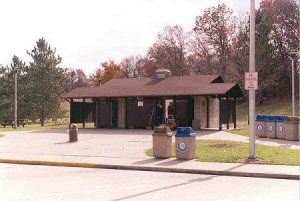I was a big fan of the HBO show, Boardwalk Empire, having watched every episode. I remember a lot of it, even now. But one tiny scene from it, however, struck me then and has stayed vividly with me.
In Season 3, Episode 7, titled "Sunday Best," it is Easter Sunday, 1923. Richard Harrow, a paid assassin, who was badly injured in the War (World War I) removes the mask that hides his disfigured face to eat his Easter dinner. He is alone in the kitchen, away from others who might be disturbed by his appearance. Before eating, he bows his head and asks to be mindful of the needs of others. Always. This is, lest I have not made myself clear, a paid killer, praying. Praying!
I myself have gone years and years without saying grace.
In Marilynne Robinson's wonderful novel, Home, Glory Boughton, a preacher's daughter, ruefully confesses to her less-than-believing brother that even at a public lunch counter she feels she must stop a moment before eating to utter a silent blessing.
Saying grace is a practice that I believe even atheists should welcome. Even if you don't believe in a creator, you must know that the earth brought forth whatever you are about to eat. You must know that people worked to bring this food to you. So be thankful; be mindful of all that. For heaven's sake!
So why have I not made this practice my own? Just as a habit of grace was hard to dislodge from Glory and, apparently, Harrow, it has been equally hard to instill in me.
Last June, I decided to take up this very worthy practice of saying grace before meals. Setting a goal of two weeks, I made a brightly colored card and clipped it to my place mat, where I could not miss it. The card fell off the deck, got rained on, was always returned to its spot of remembrance. I couldn't fault myself for lack of intention. Two weeks of being reminded in bright green to say grace would surely establish the habit in me.
Nope
I sat down to meal after meal with the card in plain sight and still almost always forget to pray. Now, seven months on, I am finally remembering to say grace at some meals. But it is not consistent. Though frustrated, I keep trying.
Does praying grace before my meal matter to anyone? Are my efforts God-driven? Am I being thwarted by forces of darkness? I don't know the answer to any of these questions, but I do know that when I remember to pray, I feel a deeper tie to all God's creation. I remind myself that I am privileged to have enough food and a safe place to eat it. I am aware that I may one day not be so blessed but that I will be blessed in other ways.
Meanwhile, I can have fun with all this humility that is forced upon me. I can see my meager efforts for what they are. I can laugh at myself and my Type A goals and my longing to be able to pat myself on the back for achieving them.
But when I do remember to say grace, I say it in earnest. I find myself in a very holy spot, able to speak to God about my day, creation, food, work, troubles, blessings. Like Richard Harrow, I also bow my head and ask to be always mindful of the needs of others. And sometimes I even take off my mask.

























